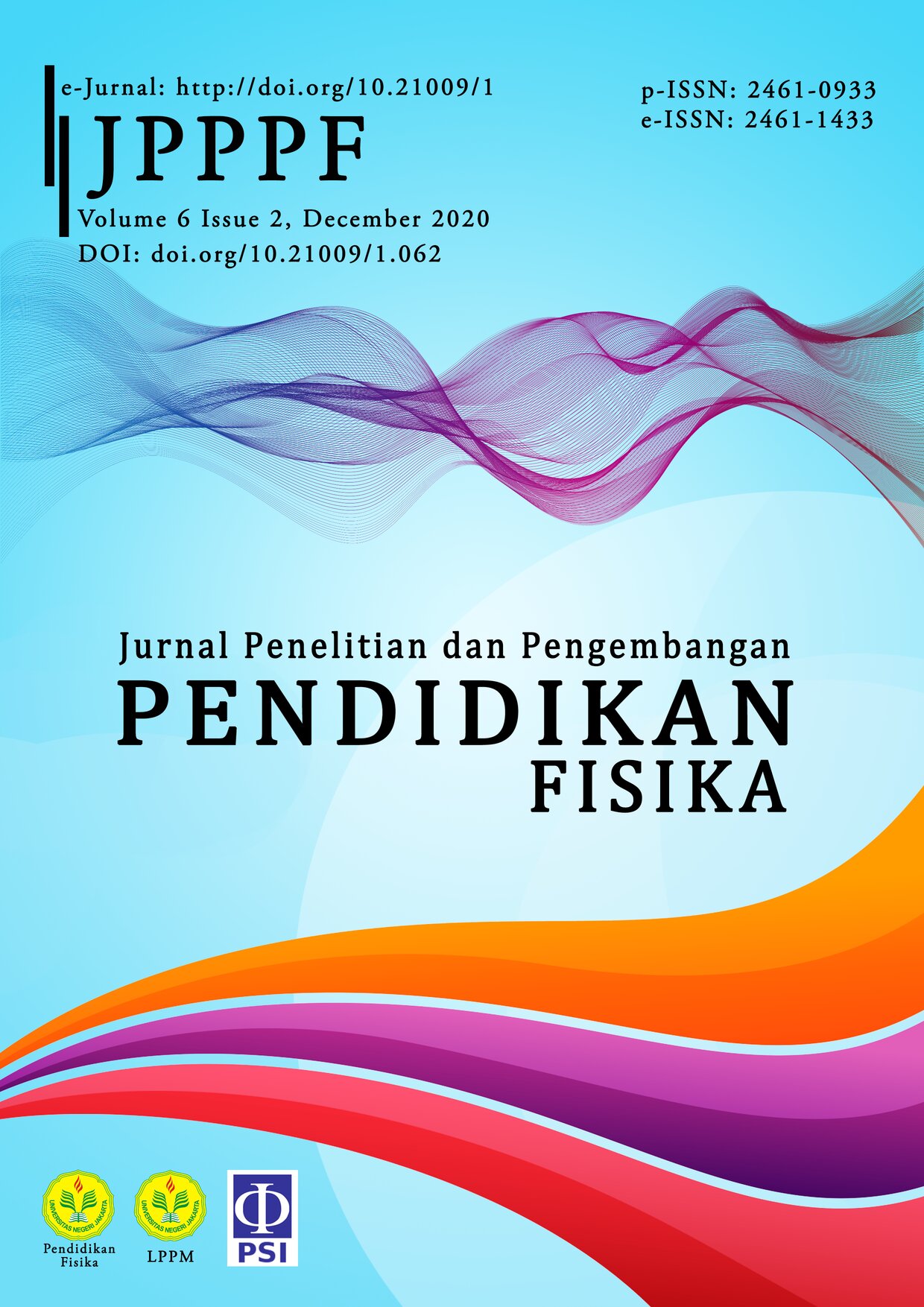The Effectiveness of Web-Based Assessment on Student’s Understanding of Concepts on Equilibrium and Rotation Dynamics
DOI:
https://doi.org/10.21009/1.06211Keywords:
understanding the concept, the web-based assessment, equilibrium and rotation dynamicsAbstract
This study aims to determine the effectiveness of using a web-based assessment on students’ conceptual understanding of equilibrium and rotation dynamics. The method of collecting data using a quasi-experimental design with an experimental procedure is One-Group-Pretest-Posttest Design. The data analysis technique used descriptive statistical calculations in pretest, posttest, and N-gain scores. Besides, using different test paired sample t-test, effect size, and g-factor. The results other the pair results ed-sample t test showed-test the use of web-based assessment had a very large effect on students’ mastery of concepts as indicated by the difference in the pretest and posttest scores. With the g-factor, there is the effectiveness of learning using a web-based assessment, and there is an increase in scores due to treatment, and students’ initial ability does not influence it. With a correlation test for pretest and N-gain scores and a correlation test for pretest and posttest scores, web-based assessment effectively facilitates all students.
References
Coletta, VP, & Phillips, JA 2005, ‘Interpreting FCI scores: Normalized gain, preinstruction scores, and scientific reasoning ability’, Am. J. Phys, vol. 73, no. 12, p. 11.
Conole, G, & Warburton, B 2005, ‘A review of computer-assisted assessment’, Research in Learning Technology, vol. 13, no. 1.
Gladding, G, Gutmann, B, Schroeder, N, & Stelzer, T 2015, ‘Clinical study of student learning using mastery style versus immediate feedback online activities’, Physical Review Special Topics - Physics Education Research, vol. 11, no. 1, p. 10114.
Gogoulou, A, Gouli, E, Grigoriadou, M, Samarakou, M, & Chinou, D 2020, ‘A Web-based Educational Setting Supporting Individualized Learning’, Collaborative Learning and Assessment, vol. 4, p. 16.
Hake, RR 2014, ‘Interactive-engagement versus traditional methods: A six-thousand-student survey of mechanics test data for introductory physics courses’, Am. J. Phys, vol. 66, no. 1, p. 12.
Hastuti, I, & Rahardjo, DT 2011, ‘Analisis Kesalahan Dalam Menyelesaikan Soal Materi Pokok Kalor Pada Siswa Kelas X Sma’, Jurnal Materi dan Pembelajaran, vol. 11.
Henderson, C, & Harper, KA 2009, ‘Quiz Corrections: Improving Learning by Encouraging Students to Reflect on Their Mistakes’, The Physics Teacher, vol. 47, no. 9, pp. 581-86.
Sutopo S, Jayanti, IBR, Wartono, W 2017, ‘Efektivitas Program Resitasi Berbasis Komputer Untuk Meningkatkan Penguasaan Konsep Mahasiswa Tentang Gaya dan Gerak’, Jurnal Inovasi dan Pembelajaran Fisika, vol. 4.
Koenig, KM, Endorf, RJ, & Braun, GA 2007, ‘Effectiveness of different tutorial recitation teaching methods and its implications for TA training’, Physical Review Special Topics - Physics Education Research, vol. 3, no. 1, p. 10104.
Korff, J, Von, & Rebello, NS 2012, ‘Teaching integration with layers and representations: A case study’, Physical Review Special Topics - Physics Education Research, vol. 8.
Laksmiari, K 2019, ‘Kemampuan Pemecahan Masalah Siswa pada Pokok Bahasan Elastisitas dengan Menggunakan Model Pembelajaran Discovery Learning di SMAN 4 Jember’, Prosiding Seminar Nasional Pendidikan Fisika.
Sahidu, H, & Astutik, F 2017, ‘Desain Sistem E-Assessment Pada Pembelajaran Fisika di LPTK’, Jurnal Pendidikan Fisika dan Teknologi, vol. 3, no. 2, p. 6.
Salas-Morera, L, Arauzo-Azofra, A, & García-Hernández, L 2012, ‘Analysis Of Online Quizzes As a Teaching And Assessment Tool’, Journal of Technology and Science Education, vol. 2, no. 1, pp. 39-45.
Sayyadi, M, & Hidayat, A 2016, ‘Pengaruh Strategi Pembelajaran Inkuiri Terbimbing Dan Terhadap Kemampuan Pemecahan Masalah Fisika Pada Materi Suhu Dan Kalor Dilihat Dari Kemampuan Awal Siswa’, Jurnal Inspirasi Pendidikan, vol. 6, p. 10.
Soong, B, Mercer, N, & Er, SS 2009, ‘Students’ Difficulties When Solving Physics Problems: Results from an ICT-infused Revision Intervention’, Proceedings of the 17th International Conference on Computers in Education [CDROM], Hong Kong, vol. 5.
Sutopo, & Waldrip, B 2014, ‘Impact of a Representational Approach on Students’, International Journal of Science and Mathematics Education, vol. 12, pp. 741-66.
Waldrip, B, & Rusdiana, D 2012, ‘Impact Of Representational Approach On The Improvement Of Students’, Understanding of Acceleration, vol. 13.
Yerushalmi, E, Cohen, E, Mason, A, & Singh, C 2012, ‘What do students do when asked to diagnose their mistakes? Does it help them? I. An atypical quiz context’, Physical Review Special Topics - Physics Education Research, vol. 8, no. 2, p. 20109.
Bakri, F, et al. 2020, ‘The Design of Physics Learning Video as Joyful-Based Learning Media Enrichment by Powtoon’, Journal of Physics: Conference Series, vol. 1491, no. 012061.
Sugiyanto, et al. 2019, ‘Analysis of infrastructure for integration of mobile learning and project based learning in technological and vocational education’ J. Phys.: Conf. Ser., vol. 1402, no. 077041.
Irawan, AW, et al. 2020, Laporan Survei Internet Apjii 2019 – 2020 (Q2), Jakarta: APJII.
Short, CR, et al. 2018, ‘Meaningful online learning: Integrating strategies, activities, and learning technologies for effective designs. Routledge’, TechTrends, vol. 64, pp. 931–933.
Izci, K, et al. 2020, ‘Exploring Effectiveness of Classroom Assessments for Students’ Learning in High School Chemistry’, Res Sci Educ vol. 50, pp. 1885–1916.
Twining, P, et al. 2020, ‘Developing a quality curriculum in a technological era’, Education Tech Research Dev.
Petra, TZHT & Aziz, MJA, 2020, ‘Investigating reliability and validity of student performance assessment in Higher Education using Rasch Model’, J. Phys.: Conf. Ser., vol. 1529, no. 042088.
Nissen, JM, et al. 2018, ‘Participation and performance on paper- and computer-based low-stakes assessments’, IJ STEM Ed, vol. 5, article number 21.
Kim, M, & Ryu, J, 2013, ‘The development and implementation of a web-based formative peer assessment system for enhancing students’ metacognitive awareness and performance in ill-structured tasks’, Education Tech Research Dev, vol. 61, pp. 549–561.











